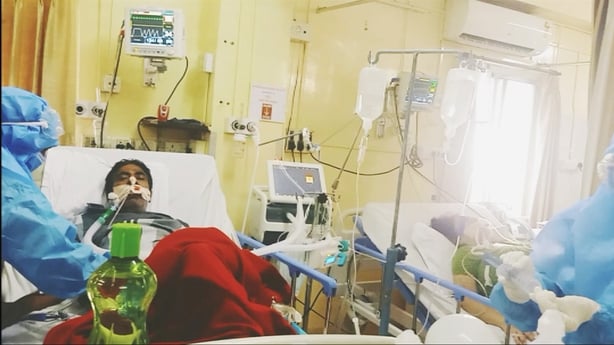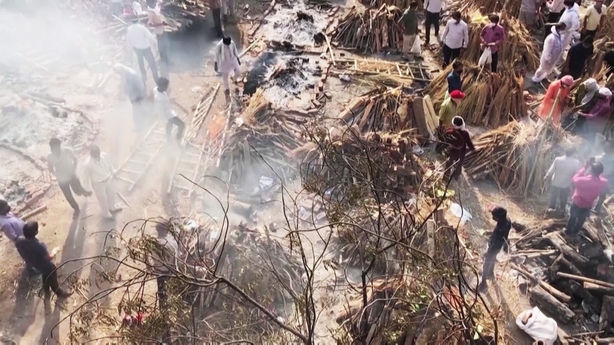As the door opens into Covid Ward 3, a phone camera gives a glimpse inside a busy ward with medical staff treating a room full of sick patients. They are just some of the 18 million people who have tested positive for Covid in India to date, from a population of 1.35 billion.
The footage was given to Prime Time by the Hope Hospital in Kolkata, which caters for the healthcare needs of street and slum-dwelling children and adults.
In recent weeks, Covid has become the facility's number one priority. Out of the hospital’s 45 beds, 40 are taken up with Covid patients and the other five are occupied by suspected cases.
Samiran Mallik, the director of the hospital, has been working day and night to increase the number of beds and wards available to cater for the increased volume of Covid positive patients seeking treatment.
According to Samiran, many of his patients are in serious respiratory distress. Sourcing enough oxygen and the correct instruments to treat patients is an ongoing concern.
"We have recently started another two wards and we desperately need medical instruments like the Bi-Pap machine, cardiac monitors, oxygen cylinders," he told Prime Time.

"There is a huge crisis of oxygen and medicine supplies in India."
Government hospitals in Kolkata are at capacity – with patients often waiting between seven and eight hours for a check-up.
They come to the Hope Hospital as an alternative.
"In Kolkata they have no beds in government hospitals, so some people have come from very far," said Soma Chatterjee, a social worker in the hospital.
"When their condition deteriorates, they are looking for a bed. And if they don't find any government hospitals for admission, they come to us and, if there is any possibility, we admit them."
She also has the unenviable job of delivering news to family when a loved one dies from Covid.
"If any patient dies of Covid, I tell their family what to do and what not to do. Because of the infection, they can't see the patient's body. We have to cover it with plastic and send it to the ambulance. "
India reported 379,257 new Covid-19 cases today. It is only the fourth country to pass the 200,000 deaths mark. The other three are Mexico, Brazil and the United States of America.
Three days ago, Dr Jagdish Chaturvedi, an ENT surgeon in a Bangalore Hospital, tested positive for Covid-19 despite being fully vaccinated.
Since then, he has been isolating at home in a bedroom. He still believes that the vaccine has given him significant immunity, despite the diagnosis.
"I’m asymptomatic – I don’t have any complaints at the moment. It’s my third day out of ten days of quarantine. I’m spending my day seeing patients online through tele-consultation," he told Prime Time.
With the virus surging, health systems have been overwhelmed. Before Dr Chaturvedi was sent home to isolate, he was working on the frontline.

He said that, for nearly a month, it has been a challenge to attend to everyone. Elective surgeries have completely stopped, and emergency surgeries are working at half capacity.
Because this particular strain in India is spreading faster than the first wave, more people are dying.
Today, a new record of 3,645 deaths was recorded. It has meant that crematoriums in places like Bangalore must contend with a backlog of bodies.
"People working in crematoriums haven’t slept for days because of the number of bodies that are coming in that they need to cremate. There is also a concern about these bodies remaining infectious," Dr Chaturvedi said.
So why has India been hit so badly in this second wave? Health officials have been infuriated by widespread participation in recent religious festivals and election rallies, during which people gathered without masks or social distancing.
Others have criticised the Indian government’s decision to reopen society in January with surburban train services back in full operation for the first time in several months and fans allowed into stadiums for cricket matches.






